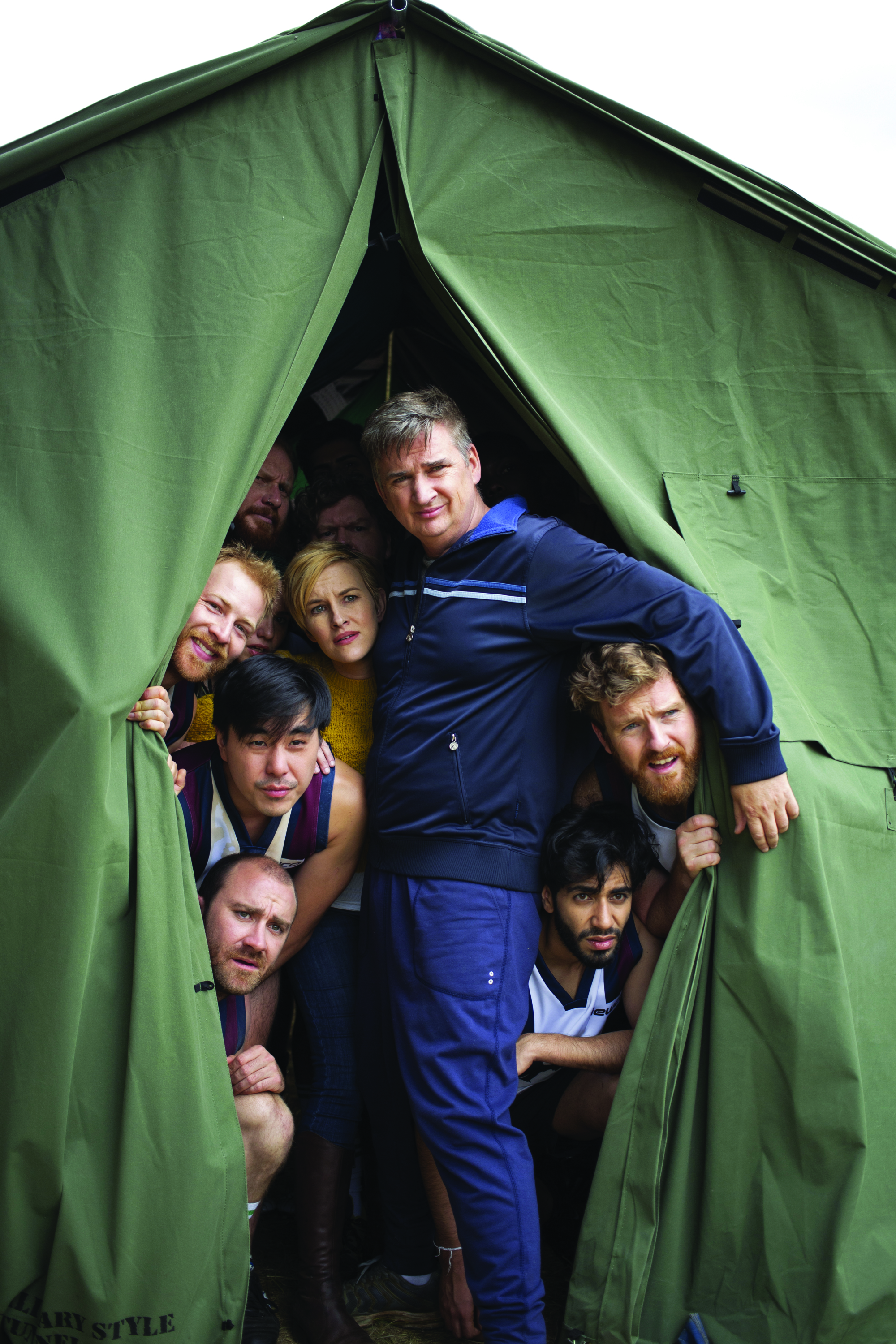Damian Callinan on Sport, Community and The Merger
After years of being brought to life as part of Damian Callinan’s live stage show, the fictional town of Bodgy Creek has hit the big screen in Mark Grentell’s The Merger (2018).
In the tradition of The Castle (Rob Sitch, 1997), the film is iconically Australian but carries a broader message. With the rural town devastated by the closure of its main employer, a timber mill, the local football club is facing the choice between a merger or extinction. Enter past club champion turned community outcast Troy Carrington (Callinan). It was Troy’s environmental protesting that led to the closure of the mill, so he suggests recruiting refugees from the local resettlement program to help bolster player numbers and draw extra funding to help save the club.
I speak to Callinan about The Merger’s transition from stage to screen, Australia’s rural landscape, and how footy and grief might just be the country’s two greatest unifiers.
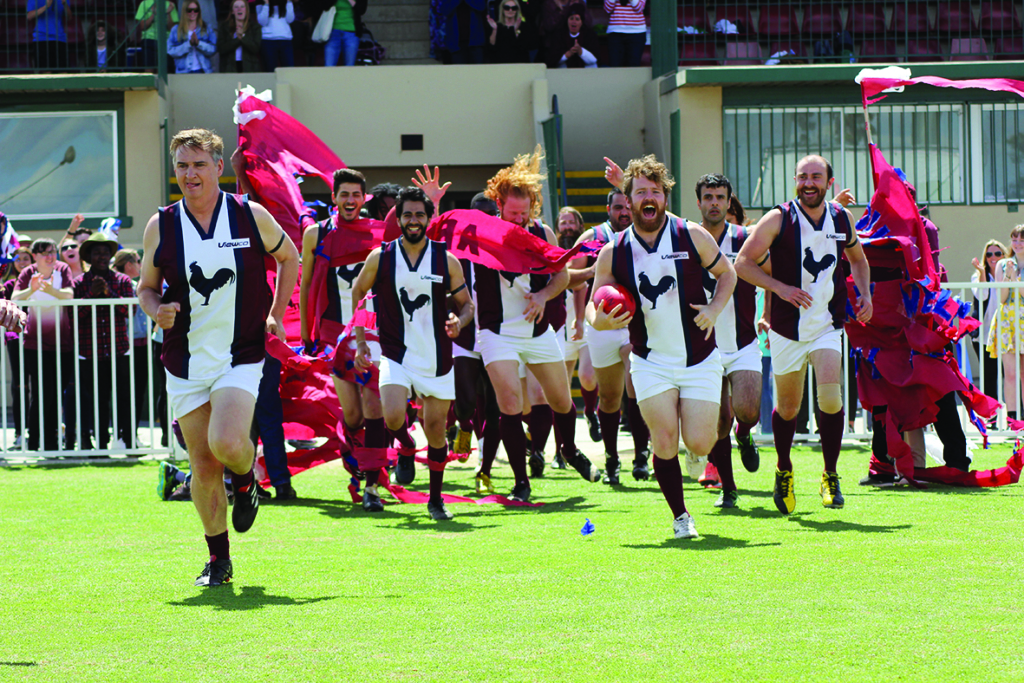
Kylie Maslen: How did the concept for The Merger come about?
Damian Callinan: The real genesis started with the creation of Troy as a character, which goes all the way back to 1999. I came up with the idea for him to be a character for […] a valedictory night for a fake Catholic school. In the great tradition of Roman Catholic schools in particular, the speaker had to be a footy player, even though they had a number of prize-winning scientists and many other more erudite and suitable choices. I juxtaposed the idea of sport and culture – so, rather than talking about boorish footy trips, he was talking about doing the Mozart trail from Prague [to] Vienna and doing gruelling aromatherapy sessions [during] preseason. It just really hit a note and lifted the show.
Troy then appeared in my next one-man show, which was where the Bodgy Creek Football Club was created, slightly based on the true story of a country footy club that had been kicked out of a country footy league for three years for a massive fracas. This team had put three opposition players in hospital, and, of course, the tabloids were taking the view of, ‘Oh, this poor town have lost their footy club,’ without acknowledging the culture of violence that existed. The club president was there with his grandson and he said, ‘What’s this kid going to do without his footy club? What’s he going to do on a Saturday?’ And he looked at the kid and the kid wasn’t looking, so he gave him a whack – just a little whack behind the ear. There’s moments in my life where shows happen in a moment, and that was it; I went, Oh, okay, I’m going to do a show about that footy club using those characters and Troy, and Troy’s going to be the agent of change.
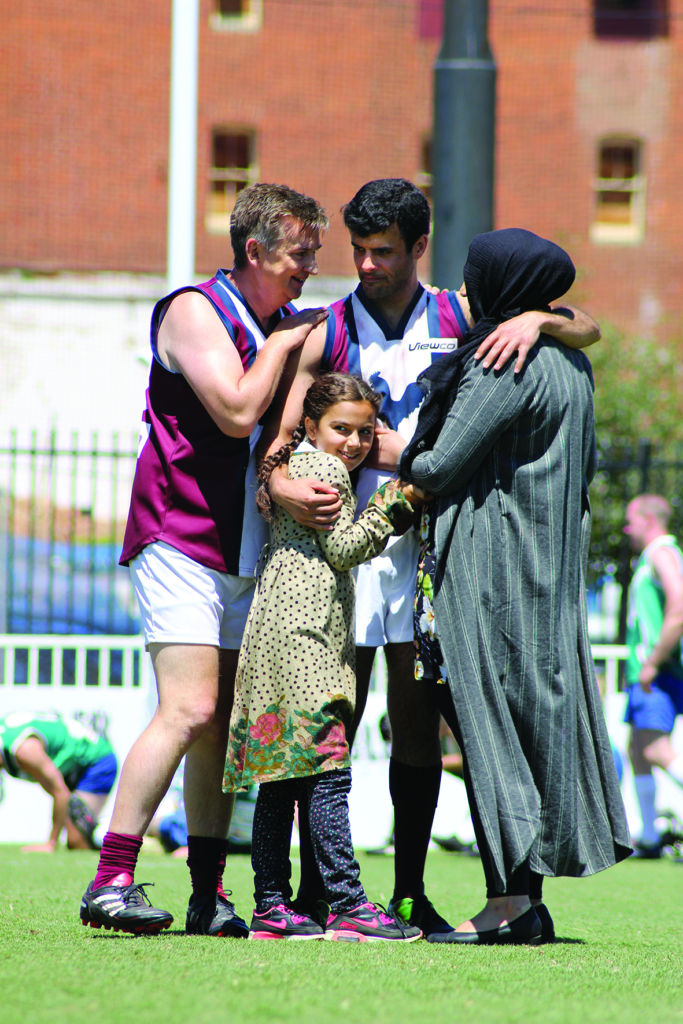
I’m interested to know how the live show was received in small towns, particularly on tours where you would jump from a small town in regional New South Wales to Arts Centre Melbourne. What were the differences between those audiences’ reactions?
I’ve performed the live show in footy clubs and small mining towns, and the first half is received in a similar way to the city. But there was one real test-value moment: when Bull, the club president, appears on stage and he’s so bellicose and quite confronting in some of his language. In the country, they would just roar with laughter and with recognition. Sometimes you could tell there was a little bit of Yeah, I wish we could still speak like that; others, just a roar of recognition, like Oh, yeah, I remember those guys. But then often, in the more (so-called) sophisticated cities, you could almost hear their collective sphincters tighten when Bull spoke.
The second half always played the same no matter whether it was city or country, and I guess that’s how I knew it was working. As Bull had a change, some of the audience who identified with him, and perhaps would say similar things to what he had said, then had to go through the same change as he changes in the show. Well, they don’t have to, but it makes it easier for them to.
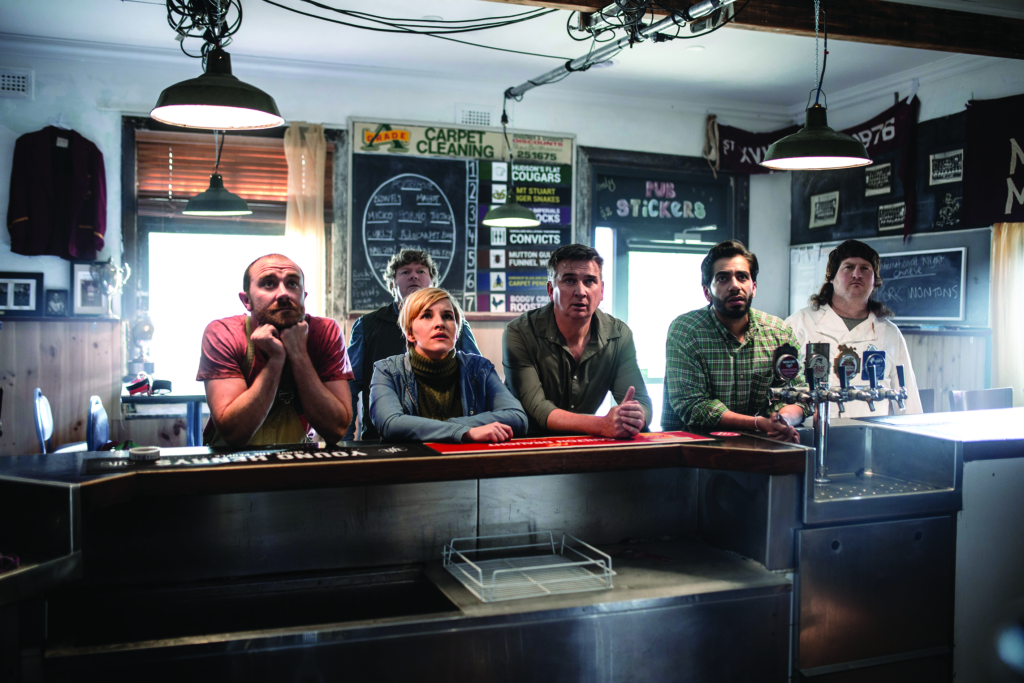
John Howard playing Bull in the film is just the perfect fit. How did that casting come about?
For a long time, it was hard to hear the voice of Bull other than the way I did it in the live show […] Screen Australia were really behind the film, but they said, ‘You need to get some names behind this.’ I can’t remember who suggested John in the end, but it was the first time I went, ‘Oh yeah, of course! Of course, John Howard.’
‘What I wanted to get to overall with this film is empathy … so that the hard left aren’t just characterising everyone as flag-cape-wearing nufties, and the right look at the refugees and see the humanness.’
—Damian Callinan
He was wonderful in it, and he really cared about it. He did a lot of research [and] he played the ‘broken man’ thing really well. I was careful with the writing of the character in general [so as] to not make [audiences] hate him […] You actually understand why: he’s had a fucking shit deal, and then he loses his job. I guess what I wanted to get to overall with this film is empathy – but empathy both ways, as there are reasons why people are either ignorant or have formed particular opinions – so that the hard left aren’t just characterising everyone as flag-cape-wearing nufties, and the right look at the refugees and see the humanness, hear the actual details of how they’ve come here, [and] cut through the media and political noise.
The characters are united by the universality of life and death: that everyone, regardless of where they’re from or what they’ve been through, experiences grief. We all have ups and downs, to varying degrees.
Yeah, and it took someone like Sayyid [Fayssal Bazzi] to be able to step over that gap. [Bull] is feeling hard done by, and then he realises that here’s someone showing empathy towards him, who’s experienced far worse or the equivalent at least […]
As I was building the story for the film – particularly by adding the Angie [Kate Mulvany] character – there became a lot more grief in the characters in the town than there was in the live show. There was Bull’s son being killed, but you didn’t see how deeply it affected all the characters. You see it in Neil [Rafferty Grierson] a little bit, but we were able to play with that a lot more [in the film]. In the end, that’s what ends up pulling it all together.
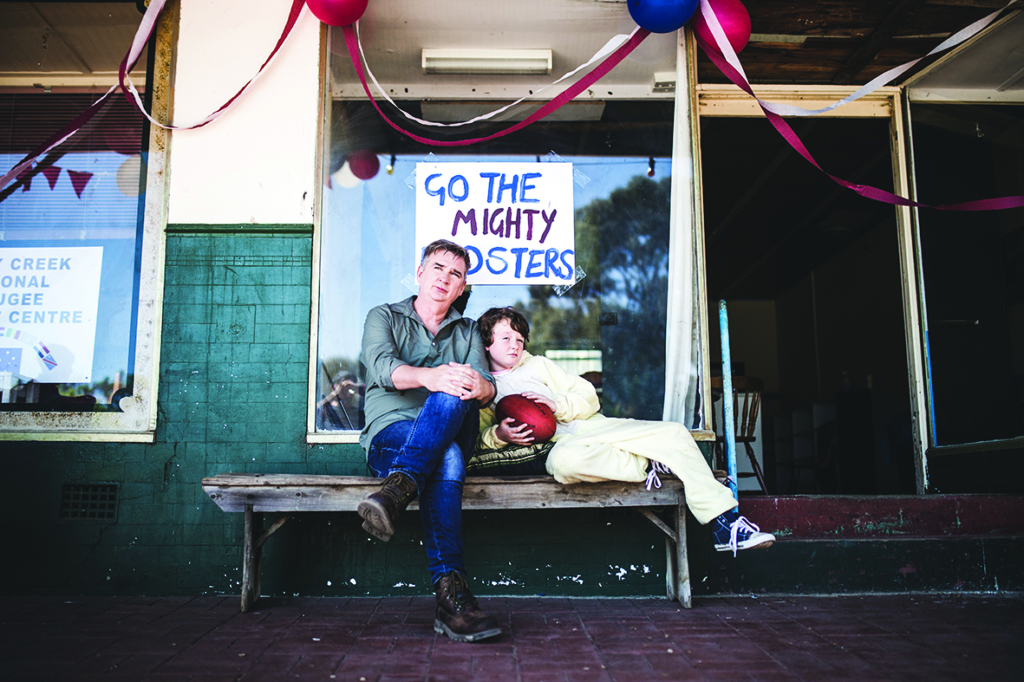
Speaking of Neil, he’s such a beautiful character; his droll humour balanced against quite a tragic figure is, I think, what lifts the mood and makes the film really funny and accessible. Was it important for you to keep that humour throughout?
Definitely. In the last little while, the shows that I have created – not all of them, but many of them, like The Merger and The Lost WW1 Diary – flirt with this precipice of people dealing with a serious issue in a funny way, or they’re just funny people in a shit situation. The trick, then, is to get that balance so that you’re not overly cutting into the drama by doing too many jokes, and vice versa. Hearing people read the script in its early stages at Screen Australia and so on, they’d be like, ‘Oh, I feel like you shouldn’t finish that with a joke; it’s such a dramatic scene.’ But, knowing I’ve been able to create that in my live shows, I had great confidence in [how] that was what was going to make this [film] a bit different.
Country and suburban footy was an enormous part of my childhood, and it was – and still is – a real glue between the generations in my family. I loved seeing that between Bull and Neil; that really hit home for me. How does footy, or similar local fixtures, unite communities through tough times?
Not to denigrate Rugby League – it just doesn’t seem to cut through as universally in the rural landscape – but, in Australian [Rules] football heartland, there’s always a footy ground. It might be disused [or] it might have been part of a merger, but it was always a part of the texture of that community. That’s why [the film’s team] always had to be an Aussie Rules team, for me. But it’s also what I identify with and connect to – and I’ve seen it even more now because I’ve toured the live show so much into those clubs.
‘The closer teams are, usually the more animosity there is between them … But football is a great leveller; sport in general is a great leveller. It doesn’t matter what you did that afternoon – it’s completely irrelevant once you’re over the fence.’
—Damian Callinan
On top of that, all the other things that used to gel communities have also weakened. Church is now, not non-existent, but it doesn’t have the same power to pull communities together like it used to. You used to see it in tennis clubs, particularly as a cross-gendered way of building community. Farms have been mechanised to such a point that those guys are often just working on their own, with their only communication [being] listening to ABC radio. So it’s put a lot more pressure on footy clubs to be the place [for community]. You can see that in the film: the town’s lost its mill, they’ve lost the footy club, what’s next? And, even when the merger means they’re all going to be driving 27 kilometres to training [and] they’re not at the local pub […] it’s an important place to them.
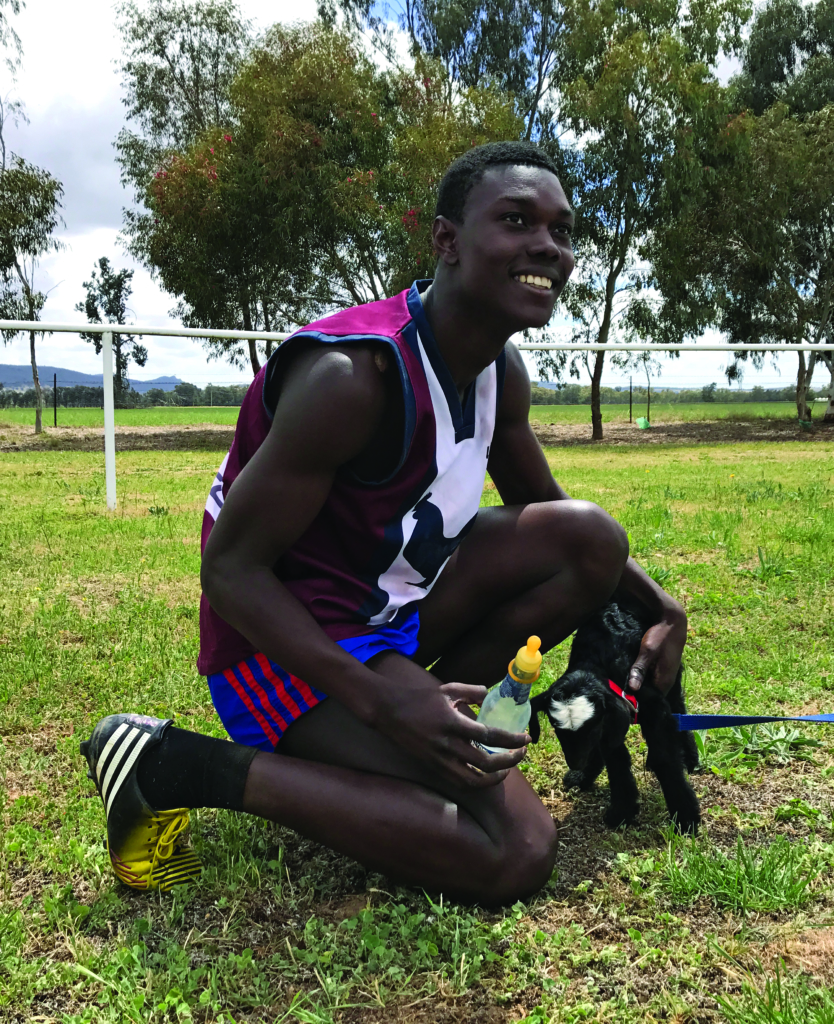
Definitely. And footy clubs are real class identifiers as well. In the two Australian Football League clubs here in South Australia, we see the cross-town rivalry between eastern suburbs and western suburbs, and I know in country footy that is just as palpable when the rich town plays the poorer town in a particular region. At the same time, you also have the commonality afforded by footy. In Bodgy Creek, the community realise that, if they come together despite their differences, they can overcome adversity – and that is really just the beginning of what they can do together.
Yeah, for sure. And that’s why I loved going all the way back to the Merger live show: I really wanted to capture that sense of how the closer teams are, usually the more animosity there is between them. Troy actually says in the film, ‘They live 23 kilometres away. They drink the same water. We have the same dickhead local member.’ They’ve got everything in common, but [their footy clubs are] what set them apart, that’s what they hate about each other. But football is a great leveller; sport in general is a great leveller. It doesn’t matter what you did that afternoon – it’s completely irrelevant once you’re over the fence. That was a quite specific [choice] to try and use that analogy: who we choose to empathise with and who we don’t.
At the end of the film, I saw you dedicated it to your dad. How did his passing influence this project, given how much of it is about grief?
Dad passed away at the end of June 2017, so we were only a couple of months away from shooting. We were in the middle of auditions at the time. It was quite a sudden thing; he was in a nursing home, so he had been deteriorating on various levels, but he was gone in a few days, really.
Dad was one of the most influential people for me – as a writer and as a believer in your own talents. He couldn’t have been more proud of what I was doing. There’s a lot of him in me, so to lose him at such a significant time was really hard […] I had this incredible moment of pride [about] turning up to the set and seeing seventy or eighty people running around just bringing Bodgy Creek to life around me […] It’s been a big deal, but everyone’s been great about it. And to be able to attribute it to him on screen is good for my family, too.
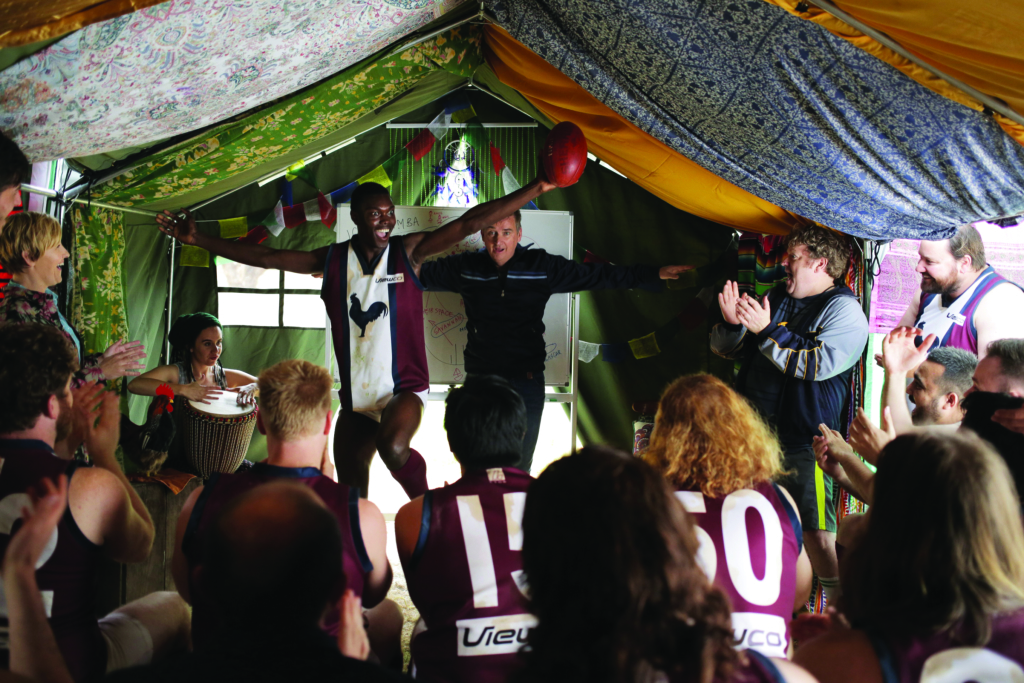
The film had its theatrical release in August last year and, before that, it was the Centrepiece Gala film of the Melbourne International Film Festival. After so many years of working on these characters, touring the show and creating the screen adaptation, does it feel like a form of release?
Relief is one of the most overwhelming emotions because the story has been with me for so long and filming is such a glacial process […] I’ve had other projects like this that haven’t got up or are still sitting there, so it is a great relief that it’s finally here. And I just want to share it. I’m proud of it. You forget about all the battles that you fought along the way in the writing, shooting and producing of it. But now, to start hearing people’s responses to it, none of those little things matter. The story is working more profoundly than I thought it would, so yeah, it’s great. It’s exciting.
